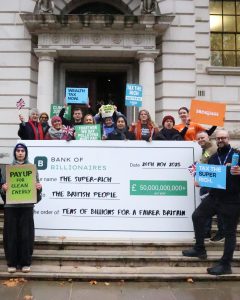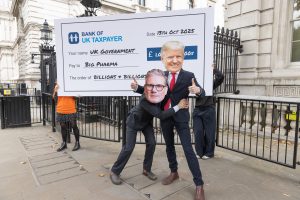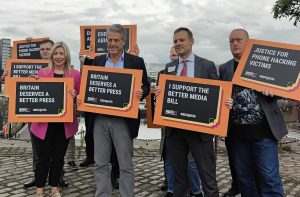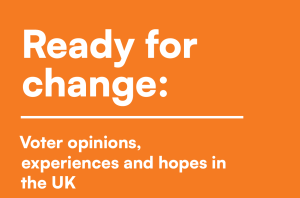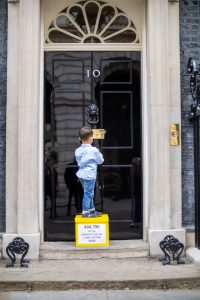
Jan 20th, 2014
The lobbying Bill: what should MPs do this Wednesday?
By 38 Degrees team
The Lobbying Bill, more commonly known as the “gagging law”, is back in the House of Commons this Wednesday. This is for a stage in the parliamentary process known as “Consideration of House of Lords amendments”.
This can sometimes be a formality, where changes to a piece of legislation made in the House of Lords are formally nodded through the House of Commons. But on other occasions it can be where the government seeks to reverse changes by asking MPs to vote them down.
We don’t know yet what the government’s intentions are for this Wednesday. But given that some of the most significant changes voted through in the House of Lords went against the government’s wishes, and involved the government losing a vote, there is reason to be concerned.
38 Degrees, along with all the other organisations who have come together to oppose the gagging law, is calling on MPs to vote to accept all the changes made in the House of Lords.
This is because none of them make the Bill worse, some of them make it significantly better. It’s still a bad piece of legislation, but the Lords amendments have made it less bad. MPs should not vote to make it worse again!
Here is a quick breakdown of the current state of play – what hasn’t changed, what has changed, and what aspects the government may seek to reverse.
What hasn’t changed:
The main thing that hasn’t changed is the definition of ‘controlled expenditure’ at the heart of the Bill. This is still the definition taken from the PPERA (2000) legislation, which many consider to be flawed.
The problem with this definition of controlled expenditure is that it catches any single issue campaigning that has become politically contentious (such as a local hospital closure, HS2, fox hunting or development budgets), not just truly partisan activity.
Controlled expenditure is “Expenditure that can reasonably be regarded as intended to promote or procure electoral success at any relevant election for—
(i) one or more particular registered parties,
(ii) one or more registered parties who advocate (or do not advocate) particular policies or who otherwise fall within a particular category of such parties, or
(iii) candidates who hold (or do not hold) particular opinions or who advocate (or do not advocate) particular policies or who otherwise fall within a particular category of candidates.”
“A course of conduct may constitute [promoting or procuring electoral success] even though it does not involve any express mention being made of the name of any party or candidate.”
“In determining whether expenditure can reasonably be regarded as intended to promote or procure electoral success it is immaterial that it can reasonably be regarded as intended to have another effect as well.”
This definition has not been changed in the House of Lords.
The retention of this definition means that all the subsequent provisions of the bill apply to a wide range of single issue campaigning activities, rather than just truly partisan political campaigning.
What has changed:
The government accepted the following changes when they were proposed in the Lords:
- The threshold for non-party organisations to register with the Electoral Commission has been raised to £20,000 for England and £10,000 for Scotland, Wales and Northern Ireland.
- The regulatory period was reduced from 1 year to 7.5 months for the 2015 General Election. For subsequent elections, it will be 12 months as previously proposed.
- There will be a review of non-party campaigning rules after the 2015 General Election. This may be an opportunity to raise broader issues such as the flawed definition.
- Some costs have been exempted from controlled expenditure: Making controlled activity accessible to disabled people; Translation into Welsh; Safety and security measures
- Rules for organisations ‘working to a joint plan’ (coalitions) now exclude small-spending organisations.
The following change was voted through in the face of government opposition, after being tabled by Lord Harries (crossbench), Lord Tyler (LibDem), Baroness Mallallieu (Labour), and Lord Cormack (Conservative):
- Only staff costs directly relating to communicating with the electorate are now included in the limits . This is a positive change from the original proposal to also include ‘background’ staff costs that are impractical to allocate. (NB: This was a compromise amendment. The Electoral Commission recommended that all staff costs be excluded for the 2015 General Election)
Key remaining problems with the Bill
The changes set out above are significant. They reflect a significant amount of work on the part of many people – including 38 Degrees members, a huge range of civil society organisations, and a cross-party group of concerned peers. It is important that this progress is not undone.
However, the Lobbying Bill is still a bad piece of legislation. It will significantly reduce the scale of non-party campaigning possible for the year ahead of an election, including single issue campaigning. This is bad for democracy and constitutes an unjustifiable limit of freedom of speech.
Here’s quick summary of the big remaining problems:
- Underlying all the other problems is the flawed definition of what should be regulated. A wide range of non-partisan, single issue campaigning is subject to regulation which should only be applied to truly partisan political campaigning.
- Total spending limits have been slashed by 60%.
- Rules about ‘working to a joint plan’ require NGOs to be jointly liable for all spending – essentially preventing them from working together under the tight spending caps.
- New constituency limits are extremely low: £9,750. The constituency regulation is still unworkable for NGOs and may be unenforceable by the Electoral Commission. (NB: Lord Harries is proposing a further amendment to narrow the scope of new constituency regulation for voting at Third Reading in the House of Lords on Tuesday. It is also championed by Liberal Democrat Lord Tyler. This is a compromise amendment – the Electoral Commission says new constituency regulation may be ‘unenforceable’. If this amendment is passed on Tuesday, then MPs should not vote to reverse this on Wednesday)
- The regulatory period is too long: 1 year apart from the 2015 General Election.
- Most staff costs are still included for non-party campaigning, where they are excluded for political parties.
- The definition of an NGO supporter is outdated and relates just to financial supporters – artificially inflating regulated communication costs.
Given the resistance of this government to further changes, at this late stage our best hopes for addressing these remaining problems are probably either that a future government repeals this law, or that significant changes are made following the post-2015 review.





